- Wed. Apr 24th, 2024
All about Japan

Top 5 scams in Japan (and how to avoid them)
By rodrigo curiel.
Japan is usually referred as one of the safest countries on Earth. In fact, The Economist has ranked Tokyo as one of the top 5 safest cities worldwide. However, not everything can be hunky-dory… right? In our 10+ years commuting to Japan we have spotted at least 5 common scams that usually target tourists as their main target. Want to know more on how to avoid them? Keep reading!
advertisement
1.- Free entrance (paid exit): On of the most common scams in Japan
Once someone said “nothing comes free” and was totally right. Entrance prices to different attractions in Japan usually are one of the main complaint of tourists, specially on their first trips. That is why free stuff usually results specially attractive to visitors when going to Japan.
This scam usually happens on the night districts of big cities like Shibuya or Shinjuku in Tokyo. The scheme is simple: a bar, karaoke or recreational center offers to receive you “for free” when similar spots usually charge you to access. However, they charge you an “exit fare” that goes anywhere from $50 to $100 bucks. If you refuse to pay, the manager will state it was “written on the entrance”, but conveniently in Japanese only. Legally you are ought to pay, so they could even request police’s assistance to force you to disburse in order to let you go.
Before entering, make sure to double check (and understand) everything written on the entrance. If something seems odd… better go to somewhere else! This is a NIHONPOT’s free tip
2.- This was a date, right? The “host/hostess” clubs
This scam usually targets men, but have been reported to happen to women as well. You would be walking on a packed Japanese street and suddenly a well-looking Japanese person approaches you to “join your for some drinks”. Thinking it is your lucky day, you accept to go to a bar “she/he believes you will love”. May Japanese Gods have mercy on you (or in your wallet, more specifically).
After an unforgettable night chatting and laughing with your new “friend”, you decide it is time to make a move. However, your host/hostess requests the bill and goes to the bathroom briefly. That probably was the last time you will see her/him as you will be left with a debt for her/his drinks (and yours, naturally) that usually go from $100 to $200 dollars. You have just been victim of the “host/hostess” club’s scam.
Some people act individually, but there are entire clubs that openly operate this way. They are called “host/hostess clubs” and target lonely people looking for some company. There, good-looking hosts/hostesses will act just as described before and may even stay while making sure you pay for their company and expenses. This is fine if that’s what you are looking for, but be aware that some folk do it maliciously, which might result on you paying unplanned budget!
Always make sure you know and understand all terms and conditions of places you visit. This is a NIHONPOT’s free tip
3.- Not so religious monks: Faith scams in Japan
This scam is not exclusive of Japan, as we have witnessed it on other Asian countries like China and Korea. A person worn as a Buddhist Monk approaches you and offers a free charm for you. He will usually state it is “free” and request you to accept it. If you take it, you are most likely about to become an unfortunate scammed tourist.
As soon as you take the “free charm”, the Monk will request for a voluntary cooperation for him. If you refuse to pay, he will insist and even follow you insistently. Some people opt to return the charm, but these “Monks” are ready to reject it and will keep requesting some compensation in return. If you give them a low denomination bill or coin, they will persist until you fork out some considerable money. Some people have stated that they even intimidate you in groups!
Monks do not usually walk around giving away free stuff. Do not receive anything unpriced from them! This is a NIHONPOT’s free tip
4.- I did not ordered that! Hidden “service” charges
Ok… you got us. This is not a scam per se , but is a nuisance at least for many newcomers to Japan. Imagine you just walked all day long and decide to make a brief stop to rest on a small local food business. As you are on a budget, you decide to spend the minimum required to sit down on the attractive shop you found. According to your calculations, you have just spent ¥1,200 yen.
After enjoying your meal and replenished with brand new energy, you ask for the bill. Your total: ¥1,700 yen. ¥500 more of what you expected! You request the manager to clarify what is going on, after he states that the remaining five hundred yen was charged under the concept of “staff service”. You just fell for the “hidden service” scam!
Tipping in Japan is unusual, so this scheme is very popular in order to pay restaurant’s staff their service. Some have stated this is something alike a “mandatory tip”. Worst part is shops don’t usually warn you about this extra, so we suggest you to ask beforehand if this is to be included on your total amount.
This extra “hidden services” are more common on restaurants that have waiters/waitresses. If you want to make sure to avoid it, we suggest you to visit self-service restaurants only. This is a NIHONPOT’s free tip
5.- You did not payed for that: “Modular” ticket prices
This last one is somewhat related to the last one. It is not a scam, but can be considered a hassle for people that do not read carefully before accessing some touristic spots in Japan. As we said earlier, it is very common for temples, shrines and different destinations to charge an entrance fee. However, most attractions have several prices that grow higher as you include more options. For example, some temples will charge you more if you cant to visit all spots inside, whilst charging less if you visit some selected areas only.
One of the most usually quoted examples is the Himeji Castle: one of Japan’s best preserved buildings right from year 1346. As imposing as it is, your trip would not be complete if you miss the imperial gardens surrounding it. You can visit both on the same trip, but will have to pay for them as they both have an entrance fee. You must consider they share the same entrance, though.
If you pay the caste only, you will pay ¥1,000 yen. Provided you want to visit the gardens as well, you can pay them together by adding just ¥50 yen, which is much less than a dollar. However, if you realize you want to access the gardens after you payed the ¥1,000 yen entrance fee, you would have to pay ¥1,050 yen, potentially doubling the initial cost if you requested both entrances together in the first place.
You could avoid a lot of this issues by learning some Japanese. Make sure to understand the basics in order to save some money! This is a NIHONPOT’s free tip
Do you know more?
These are some of our best known scams. As you can see, a lot of them can be avoided if you identify them on time. We hope our experience helps you to spend an enjoyable time in Japan and to avoid bitter pills if you have not read this article.
Do you know some scam not included here? Let us know it by commenting here or directly on out Facebook page!
Did you like this article? Give us some support and share it!
You can also subscribe to our Facebook page
It is completely free and you could participate in our exclusive events!
Click here to like
I am passionate about Japan. I have been there several times, lived there and fallen in love recursively with Japan's culture, people and food.
Related Post
Leave a reply cancel reply.
Your email address will not be published. Required fields are marked *
Save my name, email, and website in this browser for the next time I comment.
You might also like
Kanji of the year 2021 is… gold for the olympics, akihabara unveiled: the most magical place in japan, the best kept mystery of japan: imperial regalia of amaterasu.
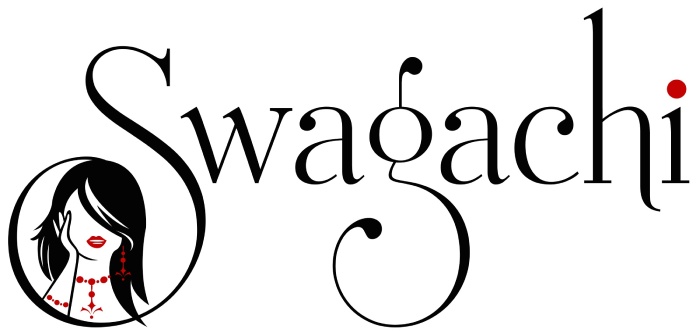
- Hit enter to search

Watch Out for These 15 Tourist Scams on Your Solo Trip to Japan
- February 17, 2021
- Japan , self-alluring , solo , travel , wanderer , wanderlust
Japan is on every female traveller’s list of places they want to visit. And why not? Where else would you get everything you wish for on a plate? Japan is a place where the old meets the new and lives in harmony. In this country, well-preserved historical structures like palaces, temples, and shrines stand tall amidst modern skyscrapers.
The other reason why Japan is a favourite among solo female travellers is that it is a safe haven . As a country that is quite safe for women, Japan stays at the top of the priority list for travel. The people in Japan are also polite and extremely welcoming. So why would you not want to book your tickets immediately and explore the beauty of Japan?
But as they say, not everything is perfect, and neither is this country. Among the glitzy and glamorous bright lights lie some darkness. There are, unfortunately, some scams that, as a first-time solo traveller, you may fall for. If that happens, your entire trip may be ruined. In order to ensure that you enjoy Japan in its entirety without any hiccups, let me warn you about some tourist scams in Japan so that you can keep your eyes and ears open. If you get an inkling that something is amiss, you will be prepared. So, without wasting any more time, let’s begin.
1. Fake money
This is a scam in Japan a lot of visitors face, and it is not an easy one to understand. The reason why this scam is widespread in Japan is that the country is a largely cash-based economy. When you pay for food, places of accommodation , or even some souvenirs that you plan to carry back home, and you are prone to this tourist scam in Japan. If you do not tender exact change, the person gives you back the money, and it can so happen that it is not authentic money, but unfortunately, you have no way of knowing.
2. Changing notes when not looking
This is another scam in Japan that a lot of first-time visitors fall prey to. When you are paying anywhere, the change that the person returns is always given on a tray. That is a part of Japanese culture. But often, when the person is giving you back the change, he may drop a few coins on the ground to distract you. When you are not looking, he will change the denominations of the coins on the tray. To avoid this, always check the change just before you put it in your purse.
3. Prank calls
When you are in a foreign country, you are completely out of your comfort zone. And as a solo female traveller, you are more vulnerable. This is a prank I have suffered in Japan, and so I am making you aware of the reality. Let me tell you what happened. I was just back in Tokyo after the entire trip and had a few hours to spare before my flight. So, I decided to keep my luggage at a coin locker at the station and stroll around. After half an hour I got a call on my phone. I heard someone speaking in broken English that my luggage has been stolen. I panicked and hurried back only to realise that I have been pranked. It was pure coincidence that it was the same day I had kept my luggage.
4. Bars rip you off
This is a tourist trap that is prevalent in the upscale areas of Japan like Shinjuku, where you have the famous Piss Alley. This is where you get some of the best alcohols in the city, and so it is a no-brainer that it should be on your must-visit list. But often time it happens that you might have a drink or two, but when the bill comes to you, it is an exorbitant amount. If you complain, the server will tell you that it is indeed the price of the drinks you have had. As a solo female traveller, you often time don’t protest and instead just pay to avoid any altercations.
5. Spiked drink
As a solo female traveller, this is one tourist trap you are always afraid of. Unfortunately, in Japan, too, this isn’t far from reality. A woman drinking alone always raises eyebrows, and Japan is no different. So be sure that you see when your drink is being made to avoid this tourist trap in Japan. Be extra vigilant.
6. Beware of pickpockets
Although the crime rate in Japan is quite low, pickpockets are not that uncommon. This is rampant in busier shopping districts like Nishiki Market in Kyoto or Dotonbori in Osaka . Imagine you are walking down the road and something catches your eye. You go and check it out, and you are caught unaware. This will be the ideal time for someone to pick your pocket. In order to avoid this tourist trap in Japan, always keep your passport and other valuables in the inner-most compartment of the bag and never leave it unzipped. Or keep the original passport at your hotel locker and carry a photocopy in your bag to be safe.
7. Temple vendor scam
This is, unfortunately, another tourist trap in Japan that I fell prey to and later came to know that it was quite common. In the beautiful Kinkaku-Ji temple in Kyoto , I had bought some snacks from a vendor. When I handed him a big note, he gave me back a smaller change than I was supposed to get back. When I pointed it out, the vendor told me that I actually paid with a smaller note. Well, in a foreign country where language is a huge problem, instances like these make you feel pretty helpless.
8. Begging monks
Is your trip to Japan even complete if you haven’t given alms to a fake monk? I think not. Often you find people dressed as a Buddhist monk begging for some money. They might even ask for donations to some religious organisation. To make matters credible, they may also show you a book with a list of names of people who have donated. Be aware that the whole operation is fake, and gangs like these have even been busted by Japanese police. So, don’t give any kind of donations when in Japan. Clarify your doubts on the begging monks here .
9. Disaster relief scam
As we all know, Japan is prone to natural disasters. In busy streets or outside temples and shrines, you may meet these pretty-well-dressed people who will ask for donations on the pretext of recovering from a natural disaster. They speak perfect English and even carry pamphlets to prove their cause. They seem harmless and extremely polite. But in all probability, this is nothing but another tourist scam in Japan. So, stay away from such people.
10. Donate for an orphan scam
Another example of the same type is well-dressed people asking for money on the pretext of helping orphan children in Japan. Hey, don’t get me wrong. Helping those who are less fortunate than you are is always a good thing. But you always have to check for their authenticity. The Thai orphan scam mainly occurs in Tokyo’s Harajuku area, where these polite people come up to you and show you different pamphlets asking for a donation for Thai orphans. Well, you are warned so don’t fall for this scam.
11. Scouting for models
As a solo travel female traveller, this tourist scam in Japan targets you the most. In some hip and happening part of town, some people might approach you with a camera in hand, compliment you on your looks and ask if they click a photo or two. After this, they will introduce themselves as model scouts, take your details, telling you that they will contact you soon. Granted that Japan is one of the leaders in the fashion world, but it’s highly unlikely that some random stranger will come up to you and just ask you to walk the runway. So, do not give out your details to anyone no matter what.
12. Restaurant scam
Food is an integral part of Japanese culture. And it is literally a treat to one’s palette to try out many unique delicacies in the country . While it is usually one of the best experiences that you can enjoy in Japan, there are plenty of ways you get scammed in a restaurant.
A waiter ushers you into the restaurant and asks if you can speak Japanese. If you don’t, you are immediately an easy target. You will be served expensive sparkling water instead of regular water which you have asked for. Then a different set of menus is brought out. It is the tourist menu where prices are usually higher than normal.
In a different kind of tourist scam in restaurants in Japan, when you order something, the server might bring out a snack. Any visitor, including me, may think that it is complimentary like a free bread basket in restaurants. If you have thought the same, you are in for a rude shock. When you call for a cheque, you realise that you have charged a hefty sum for the food you thought was free.
13. Sexual harassment in trains
Japan is mostly a safe country for solo female travellers, but unfortunately, there have been known cases of groping in overcrowded trains. Taking trains from one point to another is the easiest and cheapest way to travel, especially in a city like Tokyo. If you are already planning for a solo trip to Japan, don’t forget read my blog on 10-day solo travel itinerary for Japan .
But during peak hours, the trains are filled to their capacity, and that is when the problem arises. There have been plenty of reports where men have taken advantage of the enclosed space and groped women. Apparently, if, unfortunately, you are faced with such an unfortunate incident, shout ‘chikan,’ which is Japanese for a pervert. In most cases, the action is immediately taken. Though this is technically not a tourist trap in Japan, as a solo female traveller, this is something you must be aware of.
14. Fake police
In any country you travel to, the police are supposed to keep you safe. But what if you encounter fake police? What then?
As much as it seems unlikely in a safe haven like Japan, it is unfortunately very much present. People dressed in police gear may approach you and ask to see your passport. They may even inform you that you are being arrested for something. This is all a big setup to rob you or even worse. Remember, it is highly unlikely that a policeman would want to see your passport and accuse you of a crime you didn’t commit. So never hand over your passport to a stranger no matter what. This tourist scam in Japan is so rampant that many news agencies have covered it.
15. Free passes or passes at a reduced rate
It is undisputed that Japan is a beautiful country that has a lot to offer. But unfortunately, at times, it is expensive . In order to make things easier for the visitors who are on a budget , you have a lot of passes to various places that help you enjoy at a reduced price. But remember to always buy such passes from an official website.
There will be loads of people here and there offering you these passes at a discounted rate, and because these sights are too beautiful to behold, you will be tempted to buy them. But when you reach the said attraction, you realise that such a pass is not valid at all and you have been duped. So, my advice to you would be to always avail them from official websites.
Even though there are some scams that may ruin your trip to Japan, don’t be afraid. The pros of visiting this majestic country clearly outweigh the cons. I loved Japan for so many reasons, and its amazing hospitality is something that will always keep me wanting to go back to Japan. So, don’t you wait and instead pack your bags and set sail for an experience of a lifetime.
An introverted blogger who is looking to make unforgettable solo travel memories with one short life.
Related Posts
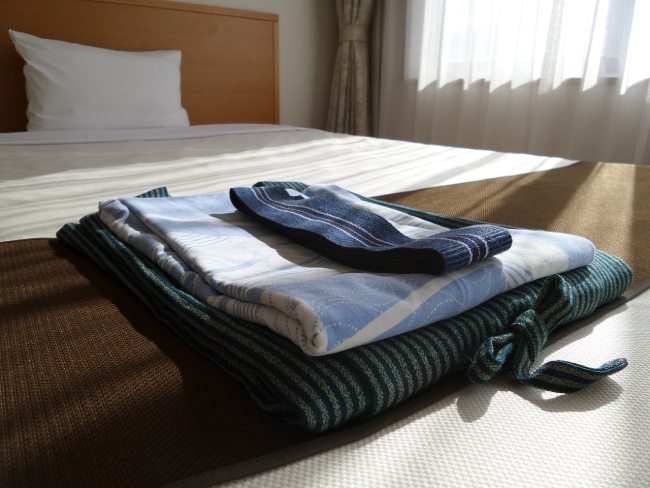
Safe & Affordable Hostels for Solo Female Travellers in Kyoto
- by Swagachi
- April 24, 2024
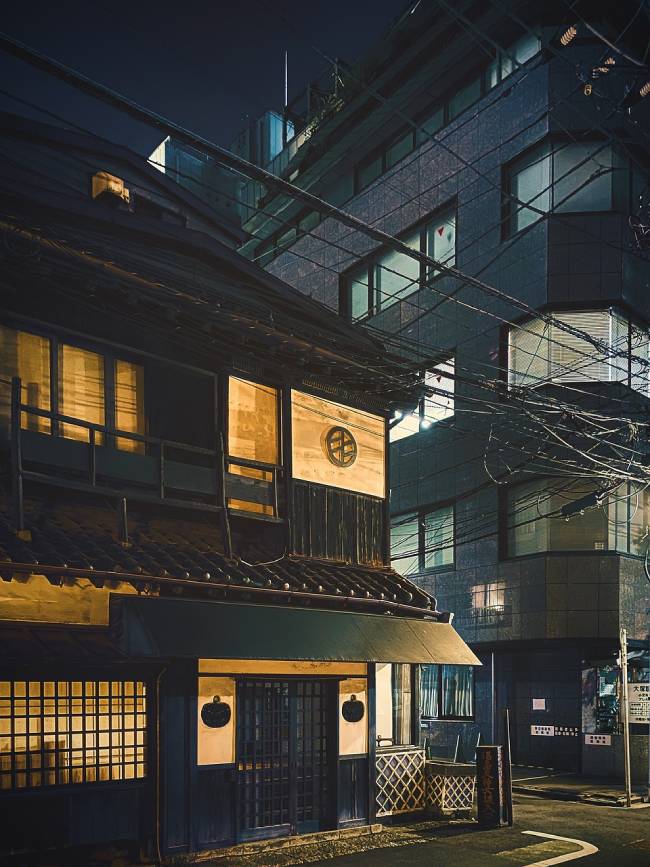
7 Budget-Friendly Yet Beautiful Hotels in Kyoto
- April 23, 2024
Leave a Reply Cancel Reply
Save my name, email, and website in this browser for the next time I comment.
Submit comment
Copy short link
How to avoid tourist scams in Tokyo , Japan in 2022
How to avoid these 6 tourist scams in tokyo , japan.
Tourist scams are the only negative side of travelling (along with the expenses). It´s unfortunate that these amazing destinations we visit have a small minority who thrive to take advantage of innocent tourists that come to provide income for their local economy. Tokyo , Japan is no different and has it´s typical scams as well. Here is how to avoid tourist scams in Tokyo , Japan in 2022. While this article will highlight the main tourist scams that tend to occur in Tokyo , I highly suggest you watch a documentary on Netflix about tourist scams called “Scam City” .
Picture Scam
One popular scam in Tokyo , Japan is when a local asks you to take their picture. They hand you their camera and ask that you take their picture. Upon returning the camera, they purposely drop it and blame you for breaking their camera, demanding you pay them. Kindly refuse to take anyone´s picture (or unless you are 100% sure they are not locals).
Taxis Overcharging
When Uber and its alternatives are not available in a destination, we must use taxis. Tokyo , Japan is no different. Whenever you hop into a taxi in Tokyo , make sure to ask them to turn on the meter. It´s also recommended to map out your journey prior to entering the taxi, so you have an idea as to how long the trip should take. This way, you can ask your taxi drive prior to entering approximately how long the trip will take and cross reference it with what Google Maps or Waze shows you on your phone.
Friendly ATM Helper
Someone approaches you at an ATM cash machine in Tokyo to help you avoid local bank fees. Their true intention is to scan your debit or credit card with the card skimmer in their pocket and watch you enter your pin number so they can drain your account later. Another version of this popular scam is when your card has trouble at an ATM machine and they approach and want to help you sort it out. Make sure to always cover the number pad with your other hand while entering your pin code. While it´s best to refuse any help when at an ATM machine, it´s even better if you can travel with credit cards that have no foreign currency fees and cash that can be exchanged in a local bank in Tokyo , Japan.
“Friendly” Bar Friends
If hooking up is part of your plans while visiting Tokyo , Japan, beware of the following scam. Two friendly girls (or guys) will make small talk and lead you to believe that there is mutual interest. They will then suggest to go for a drink and will invite you to join them to a bar nearby (which they are partners with). After a couple shots you will end up paying 5-10 times more. They will offer to chip in a small amount but if you don´t pay up, you will be escorted by the bar bodyguards to an ATM to withdraw enough cash to pay the bill. In order to avoid falling to this tourist scam in Tokyo , there are a few things you can do. First, you can suggest the bar. Second, make sure to ask for the bar menu once you arrive so you can see the prices.
Bird Poop Scam
While walking in the streets of Tokyo , someone throws a bit of white paste on your shoulder, so your natural intention is to look up thinking it was bird poop. Suddenly, a “friendly” local offers to help clean up, all this while cussing at the birds for creating such a mess. While they help clean you, they also pick pocket you. Unless an emergency, kindly refuse any “help” from locals who rush over to assist you. Keep all your possessions hidden away, ideally money/cards in an internal pocket
Guessing Game Scam
While walking the streets of Tokyo , Japan, you see a man with three boxes and he has a group of people around him trying to guess in which box the ball is placed. One of the people in the group guesses the correct answer, and the man hands him a money as a prize. They do this again with another member of the group, with the same reaction. The commotion attracts more and more people to come and see this generous street performer. Then, an innocent bystander from the crowd is asked to guess. While concentrated in focusing on where the ball is, the members in the group quickly pick pocket them for any valuables.
It´s best to stay away from public commotion and keep all valuables hidden from the public.
We know you will enjoy your trip to Tokyo , Japan, but just make sure to be aware of these common tourist scams that can dent your amazing experience.
If you already booked your hotel in Tokyo , you can still save up to 40% off its price utilizing Pruvo. The service of Pruvo will get you the exact same hotel room you have already booked for a much lower price – we recommend you to try it completely free and risk-free!
Copyright © 2021 powered by Wikifortravel, Inc. All rights reserved
Don’t forget to visit Pruvo | Contact Us
Get your cashback on your existing hotel booking!
Download Pruvo mobile app & get cashback on hotel bookings you have already made!
*The service is completely free and no credit card is required

- Phone Cases
- Gaming Pads
- Jackets and Hoodies
- Announcements
- Pulse Japan
- Payment Methods
- Returns and Refunds
- Bloggers and Influencers
Sign up and save
Entice customers to sign up for your mailing list with discounts or exclusive offers.
- instagram Instagram
- twitter Twitter
Stay Ahead: Recognize and Counter Scams in Japan Effectively
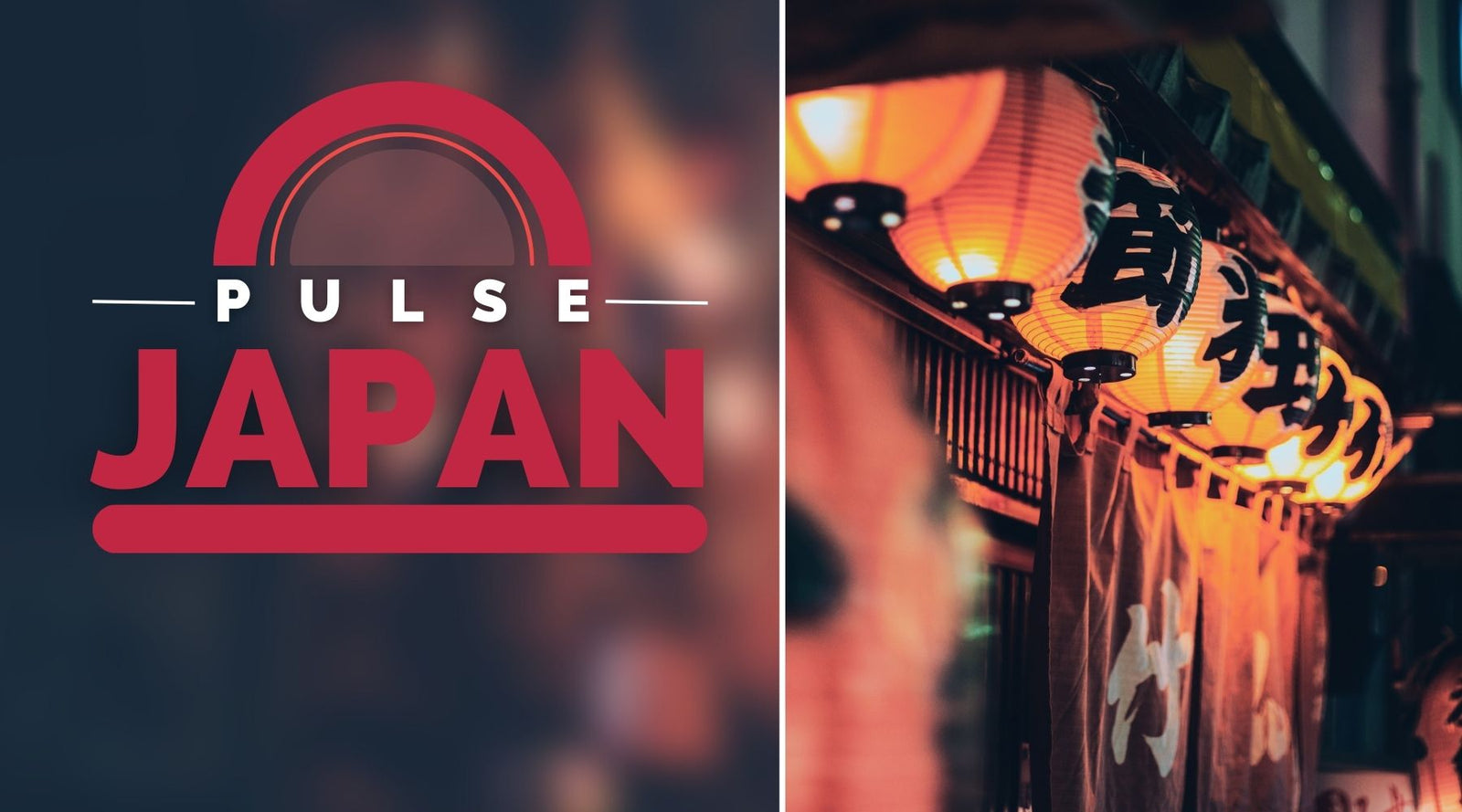
Introduction
Understanding scams in japan.
Japan is known as one of the safest countries in the world with extremely low crime rates. However, as a popular tourist destination, Japan also sees its fair share of scams targeting foreign visitors. While violent crime is rare, tourists can often fall prey to petty theft, fraud, and financial scams. It's important to be aware of the common scams in Japan so you can recognize them and avoid becoming a victim.
Scams in Japan often rely on taking advantage of tourists' lack of familiarity with local customs and language. Scammers may pretend to be friendly locals offering help or approach you with seemingly innocent requests. However, their real motives are to trick you out of money or steal your valuables.
Some scams also happen online, with scammers trying to obtain financial information or hack into foreign tourists' online accounts and services. With the right awareness and preventative measures, visitors can enjoy their time in Japan without falling prey to these schemes.
Why It's Essential to Stay Informed
While Japan has low crime rates overall, tourists are often seen as easy targets by scammers. Lack of language skills, unfamiliarity with the local culture, and tendency to let one's guard down while on vacation make foreign visitors vulnerable.
It's essential to learn about the common local scams before your trip so you can recognize red flags. Knowing what to watch out for will make you far less likely to fall victim. Being wary of situations that seem too good to be true can save you from losing money or having valuables stolen.
Staying informed also involves knowing what to do if you encounter a scam. You'll be prepared to respond appropriately, alert authorities, and minimize your losses. Knowledge truly is power when it comes to avoiding becoming a victim of scams.
Common Scams in Japan
The fake monk scam.
A common scam in popular tourist destinations involves people dressed up as Buddhist monks approaching foreigners and offering fake "blessings" in exchange for money. Often, they will tie a cheap bracelet or trinket to your wrist and then demand an exorbitant amount of money in return.
Real monks do not demand money like this. Politely decline if approached and don't allow anyone to tie anything to your wrist. Keep walking and don't engage with them further.
Overcharging at Bars or Restaurants
Some bars or restaurants in Japan have been known to take advantage of foreign tourists by overcharging them on bills. This often involves small print or confusing wording on menus in English that obscure the true prices.
Always scrutinize menus and check bills in detail. Ask for clarification if you have any doubts. Pay only the agreed amount, and don't hesitate to involve the police if you feel you are being defrauded.
Street Scams in Busy Areas
Pickpocketing and theft can be an issue in crowded tourist areas. Beware of people bumping into you or causing distractions in crowded subways, markets, or events.
Keep valuables secured and be alert in large crowds. Also watch out for groups asking you to sign fake petitions, sometimes concealing attempts to steal wallets or bags.
Online Scams
Online scams include phishing attempts to get financial information, fake accommodation listings, or even messages from accounts pretending to be friends in need. Be wary of unsolicited messages asking for personal information or money transfers.
Also, research carefully before making any online bookings or money transfers. Stick to reputable, verified platforms, and don't follow suspicious links you receive.
How Can You Recognize a Scam?
Warning signs of a scam.
Some common red flags indicate a scam scenario:
Offers that seem too good to be true
Requests for upfront payment via money transfer
Pressure to act quickly or urgently
Refusal to provide detailed information
Spelling or grammatical errors
Threats of negative consequences for non-compliance
Go with your instincts - if an offer raises suspicions, don't proceed. Check with official tourism resources when in doubt.
Recognizing Different Types of Scams
Some common travel scams to watch out for:
Overcharging: Inflated bills, rigged meters, confusing fine print
Fake services: People pretending to be authorities and demanding fees
Theft: Pickpocketing, distraction thefts, bag slashing
Financial fraud: Fake petitions, money transfer requests, phishing
Black market activities: Illegal touts selling tickets, drugs, etc.
Know the common scams so you can recognize and avoid them. Report any criminal instances to the police immediately.
Effective Ways to Counter Scams
Avoiding interaction with potential scammers.
The most effective way to avoid scams is to avoid engaging with potential scammers in the first place. This could include:
Not responding to unsolicited messages or emails from unknown parties
Saying no firmly to approaches from touts, fake monks, or petitioners
Booking only through trusted platforms and verified agents
Not taking pamphlets or other items from strangers
Not following strangers anywhere or getting into unmarked taxis
Secure Personal Information Online
Be very wary about sharing personal information online. Tips include:
Not sharing passwords, PINs, or other sensitive information
Avoiding public WiFi for financial transactions
Not believing sob stories or transfer requests from unknown parties
Using secure, encrypted apps and websites
Use Strong Passwords
Choose strong, unique passwords for all accounts and devices to prevent hacking:
Use unpredictable passwords that are long and complex
Don't reuse the same passwords across accounts
Enable two-factor authentication where possible
Change passwords periodically
Keep Software Up-to-Date
Maintain devices with the latest software and security patches to minimize vulnerabilities:
Enable auto updates on devices and apps
Don't ignore update reminders
Remove outdated or unused software
Use antivirus and firewall software
Be Informed About the Latest Cyber Threats
Keep up to date on the latest online and technological scams so you can recognize risks:
Read technology blogs and news sites
Follow trusted security experts on social media
Don't open links or attachments in suspicious messages
Learn how to check sender's authenticity
What to Do if You Fall Victim to a Scam?
Immediate steps to take.
If you realize you have fallen for a scam, take quick action to minimize damage:
Contact your bank or credit card company to halt payments
Change online account passwords if compromised
Keep details of the interaction for reporting purposes
Don't confront the scammers who could become aggressive
Reporting the Scam in Japan
To report a scam or cybercrime, contact the following:
Nearest police koban (station) for theft or fraud
Tourist information center for complaints and advice
Your embassy if passports or visas are involved
Bank or cybercrime divisions for online scams
File a detailed report with all relevant documents and information.
Getting Support and Moving Forward
Coping with being scammed can be upsetting but support is available:
Talk to your travel insurance provider regarding coverage
Seek counseling if trauma symptoms develop
Join support groups of scam victims online to share stories
Read up on common psychological impacts of being scammed
While the experience can be difficult, try not to let it color your perspective of Japan or ruin your trip. Take measures to enhance your security and continue enjoying your visit.
Recap on Recognizing and Countering Scams in Japan
Being aware of common scams and learning preventative measures is key to avoiding becoming a victim while visiting Japan. Recognize red flags, secure your data, and don't interact with potential scammers. Report any incidents to the relevant authorities. With vigilance, you can have an enjoyable and hassle-free trip.
Final Thoughts on Staying Safe While Traveling in Japan
While Japan is a very safe country overall, paying attention and taking precautions will minimize your chances of any unfortunate incidents. Avoid leaving valuables unattended, be wary of approaches from strangers, and exercise the same caution you would at home. Stay vigilant, but don't become so paranoid that you can't relax and immerse yourself in Japanese culture. Just use good judgment and trust your instincts to stay secure.
Leave a comment
Please note, comments must be approved before they are published
This site is protected by reCAPTCHA and the Google Privacy Policy and Terms of Service apply.
You may also like

Recommendations

6025684_16839
Dragon Basketball Jersey (Sakura Edition)

7895794_16839
Dragon Basketball Jersey (Lunar White Edition)

6644016_16840
Dragon Basketball Jersey (Lunar Red Edition)

6121987_16839
Shippo Pattern Basketball Jersey

1364492_16839
Asanoha Pattern Basketball Jersey

8036293_16839
Nami Pattern Basketball Jersey (Gold Edition)

4725801_16839
Nami Pattern Basketball Jersey (White Edition)
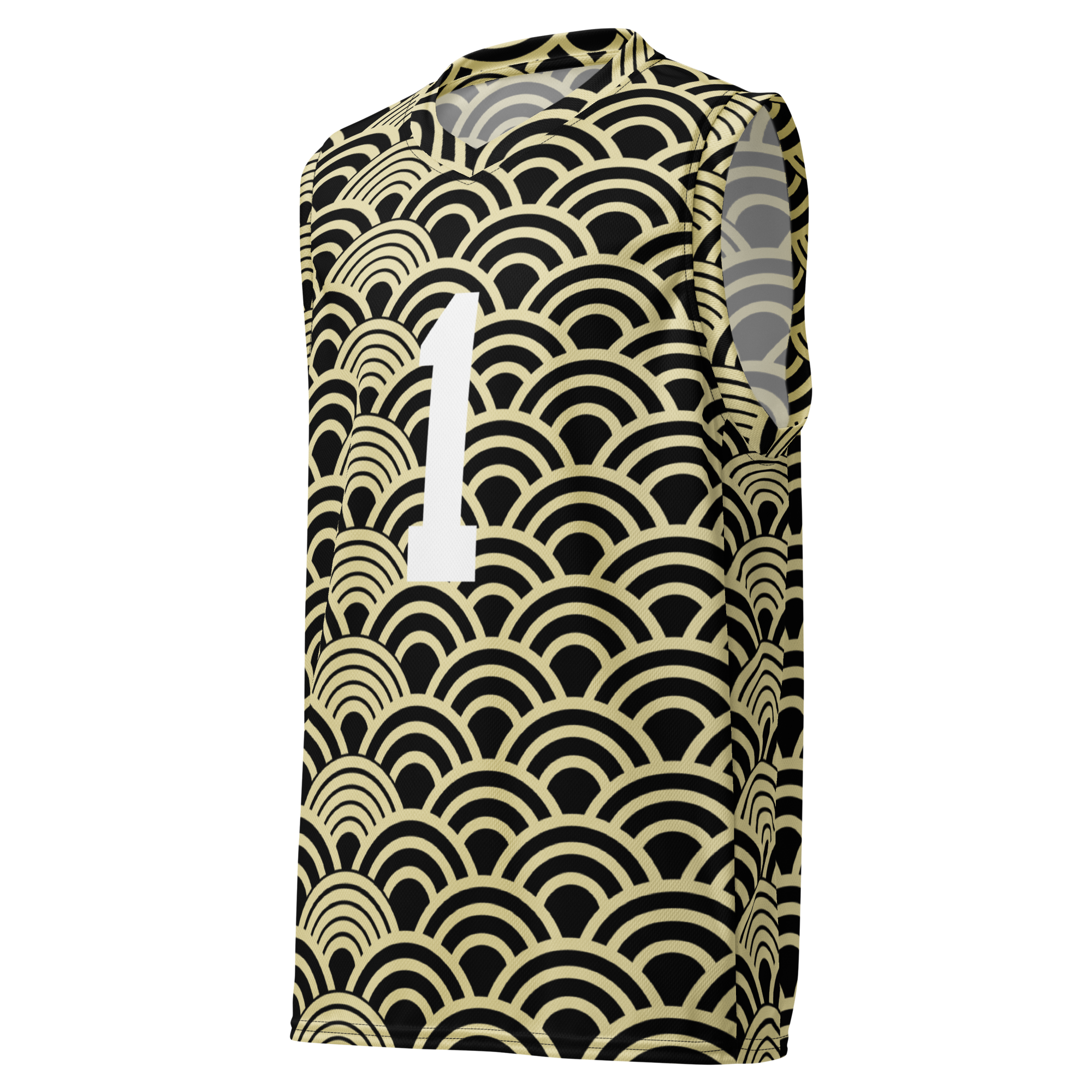
9852162_16839
Golden Seigaiha Basketball Jersey

1503968_16839
Japanese Sakura Basketball Jersey
Your cart is currently empty.
Continue browsing here .
- - K-town Now
Asia-Pacific
- - Storm Tracker
- Middle East
- Map of Memorials
- Entertainment
- - Video Games
- Europe Travel
- - Quick Trips
- - After Hours
- Pacific Travel
- The Meat and Potatoes of Life
- U.S. Travel
- Storm Tracker
- Rewards for readers
- Get Stripes
- Stripes Lite
- Archives/Library
- Special Publications
- Mobile Apps
- Email Newsletters
- Digital Access
- Home Delivery
- Marine Corps
- Coast Guard
- Space Force
- Archive photo of the day
- - Schedules Europe
- - Scoreboards Europe
- - Schedules Pacific
- - Scoreboards Pacific
- - Pacific Sports Blog
- - Military Matters
- - Force for Hire
- Out of Uniform
- Communities
- Stripes Europe
- Stripes Guam
- Stripes Japan
- Stripes Korea
- Stripes Okinawa
- Our Other Websites
- In Memoriam
- Month of the Military Child
- Best of Germany
- Best of the Pacific
- Letters to Santa
Tokyo police beef up warnings about ‘rip-off bar’ scams targeting foreigners as tourist numbers surge
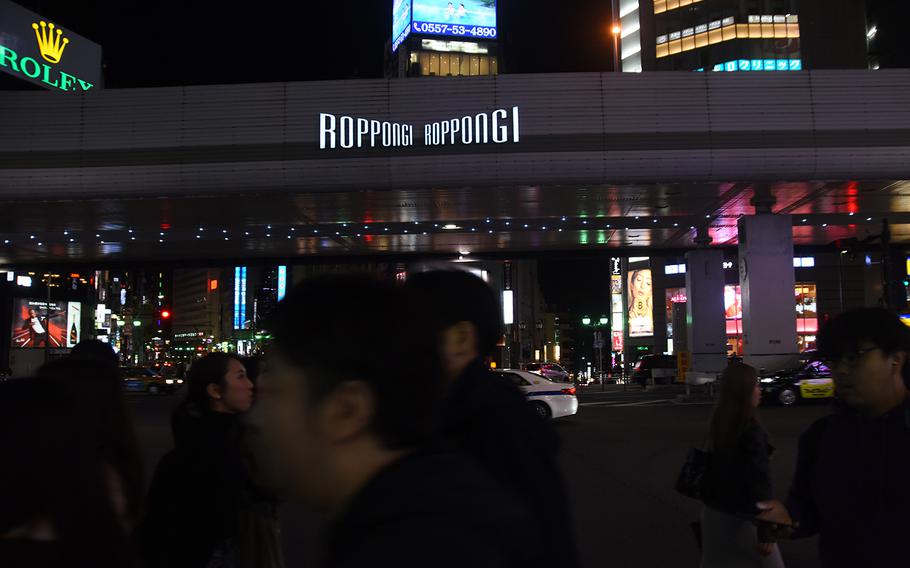
Tokyo police say scams targeting foreigners usually happen in Roppongi and other entertainment districts in the city. (Theron Godbold/Stars and Stripes)
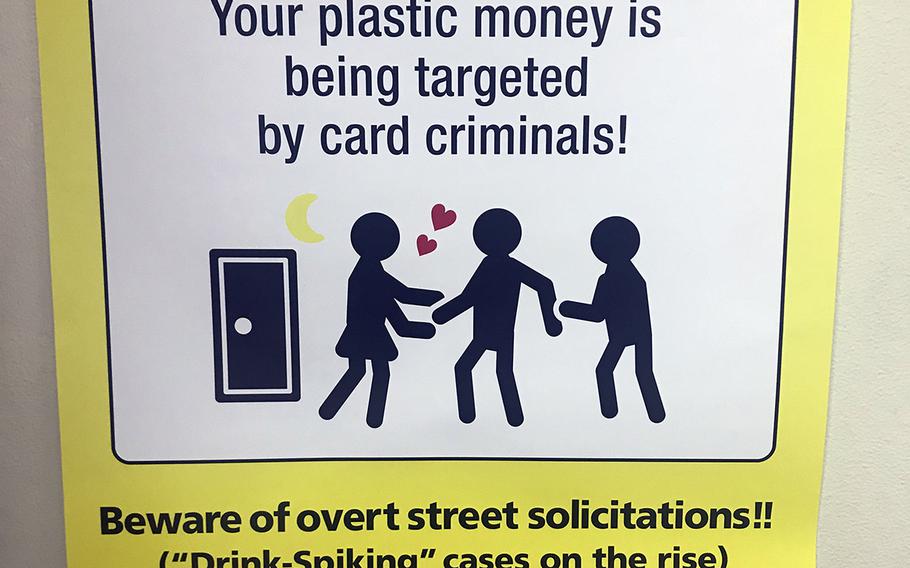
Tokyo police have increased patrols and are warning people about scams targeting foreigners in the city's entertainment districts. (Theron Godbold/Stars and Stripes)
TOKYO — Bracing for an influx of tourists as the 2020 Olympics draw near, Tokyo police are warning of a potential increase in scams targeting foreigners in the city’s entertainment districts.
So-called “rip-off bars” — a ploy targeting foreigners that may be familiar to some U.S. service members — have been on the rise, according to Tokyo Metropolitan Police. The scam typically involves patrons being lured inside a bar by street touts in areas like Roppongi and Kabukicho, then finding themselves charged excessively large tabs.
These bars, which are usually operated by foreigners from non-Western countries, have been known to charge a target’s credit card more than once. In other cases, they are served strong or spiked alcohol and fudge the bill while the customer’s consciousness is unclear.
“Entertainment districts are places where people go to refresh and enjoy, but it’s also easy to commit crimes and violence,” said Yuta Nagasaka, superintendent of the metro police’s First Organized Crime Control Division.
Although police do not keep track of crimes targeting foreigners specifically, Nagasaka said he expects these incidents to increase as tourist numbers, which surged during the recent Rugby World Cup in Japan, climb even higher.
The Japanese government is aiming to increase foreign visitors to Japan to 40 million next year when the Tokyo Olympics take place. There were 31.2 million visitors in 2018.
Police are also seeing a trend of what they call “drink back girls” who typically target foreign men, Nagasaka said. These women find a target on the street or in hotel lounges, bars or via dating apps and lure them to go out for drinks at a rip-off bar.
The women, who usually receive half of the money paid by the target, often order expensive drinks to hike up the bill, Nagasaka said.
The U.S. military, which says it has not seen an uptick in crimes targeting Tokyo-based troops, regularly educates service members about such scams.
“We highly encourage our community to take advantage of serving in Japan so they can get off base,” said U.S. Army Garrison Japan spokeswoman Gwendolyn Smalls. “We also stress that they do it safely and take the same precautions they would use when visiting any other city. Travel with a buddy, have a plan, be aware of your surroundings.”
Japanese police have increased patrols and are working with community associations and restaurants and bars to clean up the streets and warn people about the touts, Nagasaka said.
Tokyo police have put up English posters, which can also be found at some U.S. military bases, showing a man and woman luring a person to a door. “Your plastic money is being targeted by card criminals,” the posters read. “Beware of over street solicitations!! (Drink-spiking cases are on the rise).”
If you suspect you’ve been taken by this type of scam, call police immediately and have a copy of your credit card statement when filing a report, said Nagasaka, who added the best defense is avoiding the trap in the first place.
“Do not follow someone you don’t know,” he said. “You should think there is a catch when a stranger talks to you in English.”
[email protected] Twitter: @HanaKusumoto
[email protected] Twitter: @GodboldTheron

Sign Up for Daily Headlines
Sign up to receive a daily email of today's top military news stories from Stars and Stripes and top news outlets from around the world.
Sign Up Now

Latest Posts

Private Jaipur City Tours {Jaipur Traveling.com}

Surf4you Residence {Mui Ne-Vietnam}
1-677-124-44227

Gr8 Travel Tips
Japan travel scams and dangers.

🏨 Certain products/services and links to products/services may be affiliate links for which I may receive a small commission which helps fund this blog. This will not bear any additional cost to you whatsoever. 🛳
Japan Travel Scams and Dangers To Be Aware Of
Table of Contents
Japan is one of the safest countries in the world to live in and visit, but despite this reputation, there will always be exceptions to the rule.
When it comes to Japan, there are scammers who will try to trick foreigners into giving up their cash. Let’s take a closer look at some of the more popular … 🌺 Japan Travel Scams and Dangers, 🌺 that first time visitors should be aware of. You can avoid being a victim of such scams by becoming familiar with some of the most common ones used in Japan.

The Monk Scam
Japan Travel Scams and Dangers #1

Roppongi Scams – Drink Spiking

🚥 Japan Today – Drink Spiking In Roppongi 🚥
👣 Footnote 👣
If you’re leaving home for a short while and prefer not to bring your pet along and have your home more secure while away, be sure to check out TrustedHousesitters. A well established Worldwide Pet Sitting platform …
🐱 Explore House Sits Around The World! 🐱
Chikan – Subways & Trains
Japan Travel Scams and Dangers #5

🧳 Booking.com Guarantees The Best Prices For Any Type Of Property & No Booking Fees! 🧳
Japan Is A Very Safe Country

🌄 Japan. Endless Discovery 🌄
These types of tourist scams occur all over the world and not just in this country.
View this post on Instagram A post shared by JNTO Canada (@ilovejapan.ca) on Apr 24, 2020 at 6:41am PDT

Despite being a nervous flyer, Tiffy’s wanderlust has led her to visit Japan for 6 times (and counting). Her favorite cities are Kyoto and Tokyo and would choose to visit Japan over Paris in a heartbeat!

Japan is still a country I am yet to visit and is definitely on my “Must Travel To Next” list. A country filled with so much history, beautiful destinations and more, I can’t wait to visit! I am happy to present this collaborative post in the hopes of offering some helpful travel inspiration and information to you. 🛡 I Only Endorse Products/Services That Can Be Trusted & Verified &/Or That I’ve Personally Used! 🛡 😎 Safe and Healthy Travels! View this post on Instagram A post shared by Blogger | Amateur Photographer (@gr8traveltips)

🌺 Let’s Get Social On Your Favorite Social Media Platform! 🌺

✈ Japan Airlines Business Class Flight – Review
🎰 Beware Of These Travel Scams In Las Vegas
🚥 Vacation Rental Scams To Be Aware Of
📬 📬
📧 Don’t Miss A New Post … I’ll Send It To Your Inbox! 📧
🍹 Don’t Forget It … Be Sure To Pin It! 🍹
🚫 Always be aware of popular tourist scams and warnings that may occur in the destination you are visiting. 🚫
💵 The Yen is the official currency of Japan. 💵
A Blogger Since 2012, Robert has a {Passion for Travel}, having worked in the industry for over 35 years. He enjoys sharing special moments & tips on; Travel, Health & Wellness, Book Reviews and much more!
Honeymooners Guide To Croatia ...
Alt hotel quebec city – ....
- Travel Insurance Compare Our Plans Popular Benefits COVID-19 Benefits International Plans Domestic Plans Comprehensive Insurance Annual Multi-Trip Inbound Plan Cruise Ski & Snowboard Motorcycle & Moped Adventure Activities Seniors Medical Conditions
- Emergency Assistance
- Travel Alerts COVID-19 International Travel Tool Cover-More App
- Manage Policy
What are the Top Scams in Japan?
Japan is an incredibly safe country in which to travel—theft levels are low and crime is rare.
But, regardless of the shining reputation of the country, there will always be the exception to the rule! There are scammers who are responsible for tricking foreigners into giving up their cash or picking their pockets.
You can avoid meeting the same fate by becoming familiar with some of the most common scams used in Japan .
As always, stay vigilant when in public and if you get a weird vibe or feel like you’re being led down a sneaky path, trust your instincts and leave. Don’t worry about politeness if you feel you are in danger, leaving can be your safest bet.
Be in the know about what scams you should watch out for while in Japan and find out more below!
Top scams to avoid in Japan:
- Drop and Swap
- Restaurant Scam
- Spiked Drink
- Speak and Show
- Ore-Ore Fraud
Get a free quote for Cover-More travel insurance today !
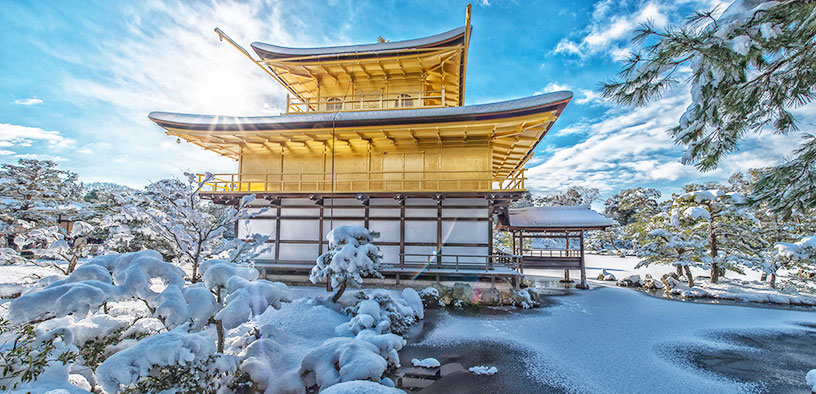
Heading to Japan but overwhelmed with what to see and do? See our ultimate 12-day itinerary for Japan .
What tourist scams are there in Japan?
The drop and swap.
Taxi drivers, waiters, shop keepers, and more will “accidentally” drop your change and pick up similar looking (though considerably less valuable) coins or notes instead.
This is somewhat common in Japan but also throughout Asia.
The Restaurant Scam
While not necessarily a "scam" as such, many travellers are put-off when local Japanese restaurants present a bill for "table charges" . The theory behind this is that you should also be paying to use the space in the restaurant, not just the food!
Don't be surprised when the wait staff take your order and come back with a small snack for the table. Although appearing without your request, don't assume it's free - because it certainly is not.
While having to pay for this unwanted dish may seem unfair, it is a fairly common practice throughout Japan .
The Spiked Drink
Drink spiking is something you should always be alert about, even in Japan. Refrain from drinking alone, particularly in seedy-looking areas, as there have been reports of some shady bartenders or accomplices spiking the drinks of patrons.
This scam is usually about money and occurs once you place an order, drink your beverage and then pass out afterwards.
Hopefully you won't find yourself being agressively woken up by people demanding payment from you or having already stolen your passport and emptied your wallet .
In some intense cases, you could be dragged to a nearby ATM and forced to withdraw all your money.
Unfortunately, sexual assaults on both men and women have been reported due to spiked drinks.
It's always best to stay with a group of people instead of partying alone.
Do you know much about methanol poisoning? You can be at risk when drinking alcohol overseas. Here's what you need to know about methanol poisoning .
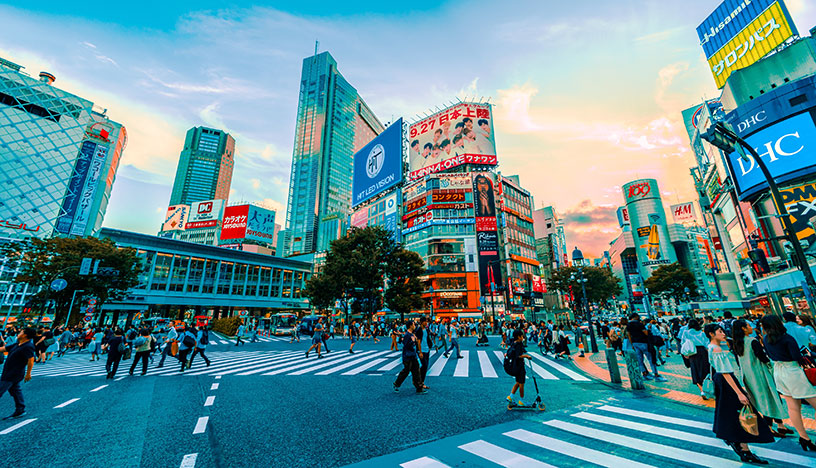
What happens if your bank card gets skimmed overseas? Check out what to do here .
As you walk along the street a beggar –typically an old or pregnant woman—will catch your attention and try to guilt you into giving them your loose change.
On the surface, this doesn’t seem terribly bad as more often than not you can either hand them a few coins to get them to stop hassling you, or simply continue on your way.
But sometimes there is a pickpocket nearby who is watching you to see where you keep your wallet .
This way, they have prior knowledge of its placement and can more easily plan to get it off you without you noticing later.
The Speak and Show
You’ll be walking around town, talking to your travel companions in English when a group of school kids or young adults excitedly approaches you.
They will not be obviously looking for anything and instead will express interest in connecting and practicing their English with you.
They’ve been studying it in school, after all, and their teachers said practicing with a native speaker is the best way to get better.
If you agree, they will offer to show you around the city in exchange for the practice.
Eventually though, you will end up in a café where you’ll enjoy tea, snacks and more…. then you’ll be presented with a bill for hundreds of dollars and your English-speaking student will be nowhere to be seen.
The Ore-Ore Fraud
This one is less likely to affect short term tourists and is more likely to affect people staying in Japan for an extended period of time, or someone moving there permanently.
In this elaborate scam, a con artist indiscriminately cold-calls phone numbers until they find someone that they think can be tricked into handing over money.
Since Japan’s society is largely cash-based , it makes this scam more effective as the scammers can’t be tracked.
Some of the con artists will even pose as police offers and demand payment for damage from a friend’s car accident.
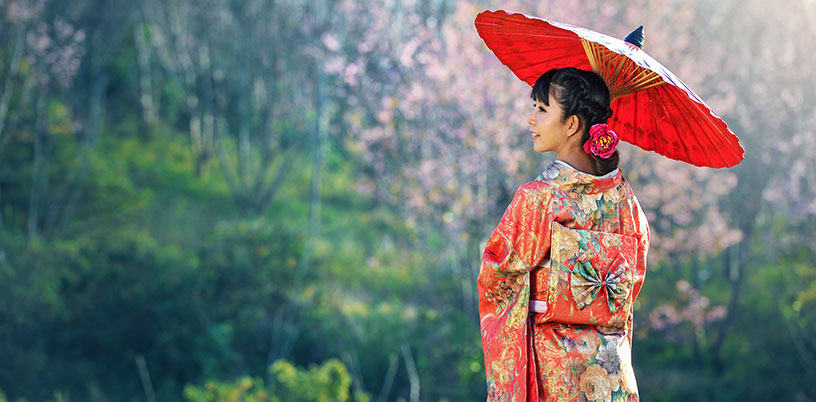
See our travel blog for more helpful information you need to know when travelling both abroad and domestically.
Keeping your eyes peeled will get you far when travelling in a new country, but it can’t hurt to have a Plan B in the off-chance a master manipulator gets your wallet or other belongings away from you.
More often than not when people in Japan approach you, it will be to offer assistance if you look distressed or to return a misplaced item .
Travellers to Japan consistently come back with story after story of the kindness, respect and helpfulness of the locals and how they can’t wait to return.
While you will hopefully not come in contact with scammers in Japan, it's always better to be aware of what to look out for !
For more travel tips and tricks for Japan, please visit:
- When to visit Shinjuku Gyoen Park in Tokyo
- Exploring limestone caves and forest trails in Tenkawa, Japan
- Visiting rice fields and ruins in Asuka Village
- Experience hot springs and onsen bathing in Japan
Consider travel insurance from Cover-More and compare our plans to find a policy that suits your travel needs.
Planning a trip?
Discover Our COVID-19 Cover
To find out what our current* benefits do – and don’t – cover, please read:
- - COVID-19 Benefits
- - COVID-19 Benefits: FAQs
- - COVID-19 Travel Guide
Plus, for helpful destination-based COVID-19 information, don't forget to check the COVID-19 Travel Risk Tool before and during travel.
*The cover information contained on the above pages refers to Cover-More policies sold on or after 26 June 2023 . For cover information on policies sold prior to this date, please read the relevant PDS .
- Places to Visit

Common Scams in Tokyo
Tokyo is one of the most popular tourist destinations for people across the globe. You will love the delicious food, themed cafes, cherry blossoms, and the rich history visible in temples, castles, and shrines. There is something for everyone in Tokyo. However, you need to be aware of some common scams or botakuri (Japanese term for the scam) in Tokyo that target tourists. Most of the scams in Tokyo follow the same principle: blatantly lying to make you give the scammer money. While most scammers want only money, others can be more dangerous such as looking for a victim to rape. The following are a few scams in Tokyo that target foreigners that you should be aware of.
Fake monk asking for money scam
This scam targets mostly tourists. This is common in the Akihabara area. You need to keep an eye out while visiting this area during your vacation. A person dressed like a Buddhist monk might come over to you and ask for money. They will request you make a donation for some religious purposes. They will show you a book with a list of names and the donation amounts of some other people in order for them to look credible. The people listed and or donation amounts are most likely fake. You should avoid making any type of donation. As they are fake monks the money given by you will go into their pockets only.
Ore Ore Sagi scam
Another scam in Tokyo as well as other parts of Japan is the Ore Ore Sagi scam. It literally translates as “It’s me, It’s me Scam”. This scam targets mostly elderly Japanese citizens rather than tourists. This is usually how the scam works. The scammer will have a list phone numbers of senior citizens. He will then call and when the victim answers the phone will say Ore Ore “It’s me It’s me in Japanese” pretending to be the son of the victim. The scammer will then say how he urgently needs money for some bogus reason. And if he can’t come up with the money then something bad will happen to him. The elderly victim will then go to the bank and wire the requested amount into the scammers bank account.
Shinjuku Kabukicho rip off bars
This scam is prevalent in Tokyo and it mainly targets the tourists. A fun night out drinking at a hostesses bar might accidentally cost you up to ¥2.6 million as well as a death threat from the bar staff if you don’t pay the money. This scam commonly occurs in the Kabukicho area of Tokyo. Kabukichō is an entertainment and red-light district in Shinjuku. If you like drinking then it might be difficult to control your urge to visit this area in Tokyo. A tout on the street will usually approach naive locals or foreigners by enticing them to enter their bar for an inexpensive price. However, in the end the customer will end up with a huge bill many times the original amount stated. Beware of anyone who comes up to you and suggests that you drink at their bar.
Roppongi spiked drink scam
Another scam in Roppongi Tokyo is the spiked drink scam. Roppongi is a lively entertainment district in Tokyo where both the tourists and locals enjoy the buzzing late-night bars and clubs. When you will enter a bar, the last thing on your mind is that you will be the victim of a spiked drink scam. You accidentally enter into a shady bar and place an order for a drink. Either the bartender or a beautiful girl you are talking with will spike your drink, you will then pass out after a few minutes. The purppose of this scam is intended to steal your passport and/or empty your wallet. After you wake up you are then told about an outrageous amount of money that you owe the bar. The bar staff will then will drag you to a nearby ATM for you to withdraw your money and pay the tab. Sexual assaults have also been reported. So, be extra vigilant when entering bars in Roppongi.
Disaster relief scam
Another scam in Tokyo is the disaster relief scam. This scam is standard in the Shinjuku and Shibuya areas. The disaster relief scam is similar to the monk scam. You will find middle-aged nicely dressed people holding what seems to be official papers approach you for donations for any disaster worldwide that recently happened. They speak fairly decent English and seem harmless and very polite. They normally target foreigners. Whenever you find any middle-aged lady asking for help for disaster victims around the world, stay away from them.
Thai orphans scam
Another scam in Tokyo is the Thai orphans scam. This scam normally occurs in the Harajuku area. In this scam, someone will approach you on the street and show you various materials and or pamphlets to get you to make a donation for Thai orphans. Do not believe them as this is all fake.
Model scouting scam
Another scam in Tokyo is the model scam. This is extremely common in Shibuya. This is one of the common scams in Tokyo, but very dangerous. They target beautiful, young, and attractive ladies who are walking alone. Some guy will follow them and promise them various modeling jobs. The victims might sometimes get raped and also forced into doing adult videos.
Like I said at first, Tokyo is basically one of the safest places in the world; however, there are a small number of unethical people who will stop at nothing to either scam you of your hard earned money or do even worse. If you plan on living here long term then you will come to know about these types of scams and will be able to avoid them entirely. If you are a tourist and travelling here for the first time then my biggest advice to you is to be very suspicious and doubtful if someone approaches you on the street either requesting you to make a donation or asking you to visit their bar.
Did you enjoy today’s article on common scams in Tokyo? If you have any questions about scams in Tokyo please leave them in the comments sections. Also be sure to check out last months article on the top sightseeing spots in Tokyo part two here.
Leave a Reply
Your email address will not be published. Required fields are marked *
Save my name, email, and website in this browser for the next time I comment.

4 Scams you should avoid in Japan!

You may also be interested in ...

How is the Coronavirus Affecting Japan | Is it Safe?
The Coronavirus situation in Japan has been worsening in recent weeks. In this video I discuss major news and events from across the country and whether it's still safe to visit the country....

Why Japan's bear problem is about to get worse...
Pete and Chris find out that apparently Ryotaro knows...everyone in the world. Also... bears are back and in a big way! ...
Should travellers be worried about Fukushima?
The radiation may be lower than most people experience on an aeroplane, so why don't people visit Fukushima? ...

When travelling in Japan goes wrong
Pete and Chris go through more of your (even crazier) Japanese travel stories! ...

How to handle physical contact in Japan
More of your incisive queries answered, and is hugging allowed? Who doesn't love a hug? People we don't want to be friends with, that's who. #huggyboys...
How not to rob a Japanese convenience store
True crime being such a hot podcast topic, Chris and Pete delight listeners with one of the most underwhelming robberies in recent memory. ...
Don't do this in Japan!
Chris and Pete go into more detail on the subject of one of Chris' most popular YouTube videos, 12 things not to do in Japan - also the guys read out some of your emails from the fax machine. What they're doing coming out of a fax machine, w...
Natural disasters: is Japan safe?
Chris and Pete touch on the recent seismic and atmospheric activity and ask the question...is Japan safe? Pete goes on for ages about oyster ice creams, and Chris educates us all on bear safety. Important stuff....
Large Earthquake Ruins Natsuki's Day
Chris films in a Pachinko parlour, and gets caught up in a rather robust quake. He also debuts his new character, 'American Man'. ...
Japanese Policemen and Beatboxing Teachers!
This week on the Abroad In Japan podcast Chris earns himself a speeding ticket and Pete finds himself explaining Tums to the Po. Chris beatboxes for some reason. Just listen, won't you?...

Inside Fukushima: What Happened After the Nuclear Disaster?
The Fukushima Nuclear Disaster is unimaginable in scale. 8 years later in the midst of a $27bn decontamination effort, we explore inside the disaster zone and meet the locals to uncover the situation in Fukushima; past, present and future....

I Ate Japan's Deadliest Dish | Poisonous Blowfish (Fugu)
Blowfish (Fugu) isn't a delicacy to be taken lightly, given that the poison within the fish can cause paralysis. Ryotaro and I travelled to Yamaguchi - Japan's home of Fugu - to see the dish being prepared and to taste it for the first time....
- English (EN)
- Español (ES)
- Português (BR)
Is Japan Safe? Crime Rates & Safety Report
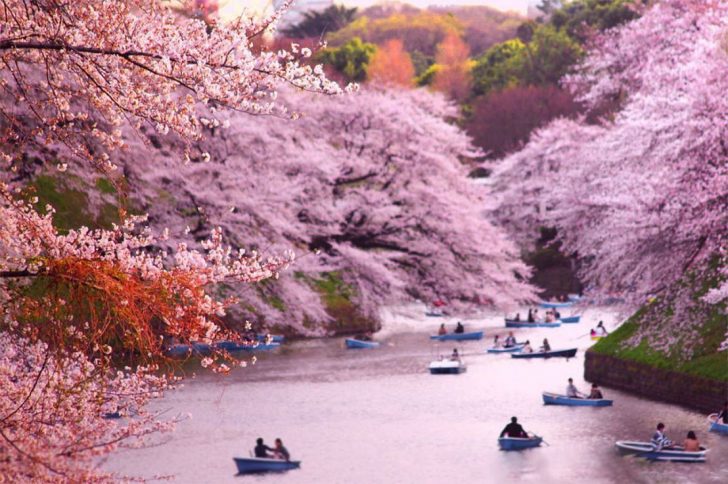
- Japan : Safety by City
Japan is a sovereign island state in East Asia.
Located in the Pacific Ocean, the “Land of the Rising Sun” stretches from the Sea of Okhotsk in the north to the East China Sea and China in the southwest.
Now, a geographically interesting aspect of Japan is that it’s actually a stratovolcanic archipelago consisting of about 6,852 islands.
The four largest are Honshu, Hokkaido, Kyushu and Shikoku, and they makeup about ninety-seven percent of Japan’s land area and are often called home islands.
Japan is known and talked about as a country that successfully combines tradition and the contemporary, and there are many traditional structures and practices preserved, matching perfectly with the modern structures and practices that will definitely prevail during your exploring of Japan.
It was the first Asian country to independently modernize, and it didn’t stop there: the country continues to follow contemporary flows, embrace new technologies and architecture, but with a unique touch typical only for Japan.
Yet, unlike many countries, Japan never insisted on removing older technologies and structures.
New ideas just pile up beside the old ones, and oddly enough, they make a perfect match.
- Warnings & Dangers in Japan
OVERALL RISK: LOW
Generally, Japan is a very safe country to travel to, probably one of the safest. Still, never let your guard down, and be wary of pickpockets and scammers as you would in any other country.
TRANSPORT & TAXIS RISK: LOW
Public transport and taxis are safe and reliable, but it is recommended that you be very careful with your valuables in public transport, since that's where pickpockets operate. Women on crowded trains should bear in mind the existence of chikan, which means molesters, or gropers, though they usually target local women since they're less likely to make a scene.
PICKPOCKETS RISK: LOW
Pickpocketing and bag snatching are common in tourist landmarks and crowded areas, as in any country. Be vigilant at all times and never leave your belongings in plain sight. Be careful in crowded areas, in railway and bus stations and especially in public transport. Still, compared to major Western countries, pickpocketing is not nearly as common in Japan.
NATURAL DISASTERS RISK: LOW
As a complete opposite to the calm criminal situation, natural disasters are common and mostly occur in the form of earthquakes, tsunamis, and volcanic activity.
MUGGING RISK: MEDIUM
You shouldn't worry too much about being mugged or kidnapped in Japan since it rarely occurs. However, never accept drinks from strangers, and avoid entering shady bars and clubs in red-light districts.
TERRORISM RISK: MEDIUM
Even though there haven't been any terrorist attacks in Japan's recent history, they shouldn't be ruled out, so remain aware of your surroundings at all times.
SCAMS RISK: LOW
Scams are very common in Japan, like in any other country that is a top tourist destination. Still, even scammers do not operate here as much as they do in the West. There have been reports of fraudulent credit card charges, especially in the areas of Roppongi and Kabuki-Cho in Tokyo, so it is highly recommended not to allow waiters or vendors make any transactions with your credit card on their own. Keep an eye on your credit card all the time
WOMEN TRAVELERS RISK: LOW
Women traveling solo are completely safe in Japan. If you have your wits with you and follow your common sense, avoid dark and desert alleys or walking alone with strange people at night, your trip should go smoothly.
- So... How Safe Is Japan Really?
Japan is extremely safe, in fact, it’s probably one of the safest countries in the world, with crime rates much lower than in most Western countries.
Street crime is extremely rare, even late at night.
Of course, this does not mean that Japan is completely crime-free without any dangers and, and you shouldn’t let your guard down.
Pickpocketing exists here as in any other country: be wary of pickpockets bumping into you on the streets, and generally be careful with your valuables, especially in crowded places, such as trains and at Narita Airport, and if you follow common sense, your trip should go fine.
Another issue, more annoying than anything else, is that there is a lot of drinking in the evenings, so during the day, you may start running into drunks on the streets, even though this is not too big of danger because alcohol-related violence is extremely rare.
Then there are red-light districts, mostly in large cities, that seem a little shady, but are actually never dangerous for visitors, but you should bear in mind that some smaller backstreet bars have been reported to astronomically overcharge customers for drinks.
There have even been reports of foreigners being drugged at those places and then charged as ¥700,000, or close to $7000, usually for something they don’t even remember ordering.
Just avoid going into places suggested by someone you’ve never met, and you shouldn’t have any similar problems.
- How Does Japan Compare?
- Useful Information
Most countries do not need a visa for any stays shorter than 90 days. If your nationality is one of the following: China, Russia, CIS countries, Georgia, or the Philippines, you will need to obtain a visa. However, if you are not sure about your visa status, visit www.doyouneedvisa.com which will let you know whether or not you need a visa based on your nationality and the country you want to visit.
Japanese yen is the official currency in Japan. It is recommended that you exchange your money in official post offices or banks, in order to get the best rate possible. Credit cards are accepted at most major establishments, but it's still advised to keep your cash with you at all times.
Japan generally has a temperate climate, characterized by four distinct seasons: in winter, from December to February, the weather is dry and sunny along the Pacific coast and the temperatures rarely drop below 0°C. The best time to visit Japan is in late spring, from March to May and late autumn, September to November, since there is little precipitation, the skies are clear, and temperatures are mild. To top it all off, spring's when the delicate cherry blossom leaves everyone in awe and vivid colors of autumn are visually jaw-dropping.
Tokyo International Airport, often referred to as Haneda Airport or Tokyo Haneda Airport, is one of the two primary airports that serve the Greater Tokyo Area. It is located in Ōta, Tokyo, 14 km south of Tokyo Station.
Travel Insurance
Just like anywhere else, we recommend getting travel insurance when traveling to Japan, since it covers not only medical problems but also theft and loss of valuables.
Japan Weather Averages (Temperatures)
- Average High/Low Temperature
Japan - Safety by City
Explore japan.
- Are There Snakes in Japan? Should You Be Worried?
- 10 Best Beaches in Japan
- 10 Most Dangerous Cities in Japan
- 11 Best Zoos & Aquariums in Japan
- 10 Most Beautiful Castles in Japan
- Are There Sharks in Japan?
- 16 Best Flea Markets in Japan
- 10 Safest Cities in Japan
- 16 Pros and Cons of Living in Japan
- 9 Most Visited Cities in Japan
- Enjoying Christmas in Japan: What to Do & Where to Go
- Where to Next?

24 Reviews on Japan
“NATURAL DISASTERS RISK : LOW” ???
Hello, it’s mistake…
I’m Japanese and I agree with your idea. There might be a large earthquake.
Wrong rating level about NATURAL DISASTERS RISK
And the other mistake is: It places South Korea as High Risk in terms of NATURAL DISASTERS RISK ( https://www.travelsafe-abroad.com/south-korea/ ): “When it comes to natural disasters, South Korea has had a history of earthquakes, but most of them caused little damage. Another issue when it comes to natural disasters is typhoons that may occur in August and September, as well as tsunamis.” South Korea is less prone to typhoons, letting alone tsunami. If it gives low rating of natural disasters risk to Japan, NO RISK should be given to South Korea. Also, Japan Weather Averages (Temperatures) is terribly wrong! Winter is way colder even though Hong Kong is about 16C – 20C in winter!
Great but...
Natural disasters need to be medium-high because Japan is in the Ring of fire and that means Japan can get struck by earthquakes. Typhoons can also hit the area too.
I think so too.
Not as safe as you think
Overall, I feel equally as safe living in Japan as I do in my rural hometown in the US. That being said, some crime is on the rise here and you should be careful when you’re walking around some major cities late at night. Japan happens to be the only place where I’ve been the victim of a completely unprovoked armed assault (with a knife). The mental health situation in Japan is a bit of a black mark on the “perfect” image that lots of westerners often attempt to attribute to it, and it seems like more and more disturbed people are committing horrible acts of mass murder or assaulting people at random.
This isn’t meant to scare anyone; enjoy this unique and beautiful country if you’re visiting. Just please don’t assume you’re going to some perfectly harmonious place where crime doesn’t exist; there is still crime, and you should never put yourself in a situation where you could be vulnerable. Drink responsibly (or don’t drink alone if you’re really going all-out), stay smart, and take special care in the major urban areas.
Get to know the Real Japan in 2021.
Japan is not a bad destination but like all Nations be wary of Scammers and Pickpockets. Knife attacks are somewhat Common especially the Big Cities of the Nation.
Average temperatures are unrealistic also natural disaster are not low
I have been scammed in Tokyo, and had my wallet stolen in Harajuku. I still feel extremely safe in Japan. I moved to Kyushu a few years ago and even built a home here. While you should obviously practice common sense, It’s a wonderful place to visit. I’ve seen people leave their cars running while they go into a convenience store, leave purses/laptops unattended while the owner orders or uses the restroom. People will go out of their way to help you, though I feel like this is more common in the countryside than it is in the Larger tourist areas. I highly recommend visiting the countryside, lots of hidden gems to be found. 🙂
A more accurate view of the weather
The temperate guide is totally wrong. 30C in January? Maybe in Okinawa. The summer is hot in most places – that part is right. It hits over 30C daily, and almost never falls below 20C, even at night. The humidity is also extreme! You will sweat… imagine New Orleans or Cairns in summer. Winter, on the other hand, is cold. Frosty, snowy cold often. Depending on where you are, the winter could range from south of England/London style, with little snow but frequent nights that get below zero, and days that rarely see low double digits, right down to more North American style winters with deep, long lasting snow, and nights that could get into the double digits below zero.
The temperature is not even that high in Okinawa (16C-20C) in winter!
Japan Is Very Safe
Corrections
Many wrongs, it should be NATURAL DISASTERS RISK: HIGH, earthquakes, tsunamis, typhoons, volcanic eruptions, you name it. EVERY year. It is possibly the country with the Highest Risk for Natural disasters. MUGGING RISK : LOW, what, it almost never happens, really low risk. TERRORISM RISK : LOW, it has happened just once in almost 80 years or more.
NATURAL DISASTERS RISK: LOW!? THERE IS SO MANY TSUNAMIS AND THYPHOONS IN JAPAN
Really beautiful country!! But I think it isn’t THAT safe, I had men stalk me, so I suggest to not go into dark street corners- and when someone IS following you, don’t go to your home/hotel, they’ll come back tomorrow or will try to unlock the door.. Try to go to public and crowded places! They might lose you and give up.. Overall I think it’s a 56 for me.. 95% of the women who got stalked don’t speak out.. and the police dont even do anything abt stalkers either.. but I love my country though! =^^=
sexual harassment
It is true what Miya says sexual harassment is a big risk and most do not speak out. Because people are super sexually repressed in Japan, many can act out in frustration. Men will steal your underwear off the clothesline, stalk you or try to look up your skirt on an escalator – it is also not uncommon to get touched on the metro or have someone openly masturbating…I even had a young man brave enough to try reaching up my skirt as I was ascending a stairway, midday in public with a group of friends!…in all these situations, most Japanese people will be uncomfortable however, they tend to look the other way and pretend it is not happening. Look them in the eye, yell, scream, laugh, shout, cry, in any language – take a photo or video with your phone – do anything other than pretend it is not happening and they are generally so shocked they just run away. Post the photo or video on social media to shame them and report to the police. They have to understand that what they are doing is not okay and not acceptable.
NATURAL DISASTERS RISK : LOW???? You must make your website and research data reliable instead of nonsense.
Japan is the most dangerous country as in natural disasters, rated one star our of five.
If you do that again against common sense, I will never use you and spread the words.
you do know you put 4 stars don’t you?
One of the safest places you can visit, but it is still on Earth with normal humans. Violent crimes against random people are relatively rare, in particular against tourists but of course like anywhere with humans they can and do happen.
Pickpocketing is one of the more common crimes overall, but keep your wits about you among crowds of suspicious people in high traffic tourist areas. Transportation is efficient but crowded in major cities and can be a place for gropers or pickpockets. Once again its a rare occurrence against tourists as they are more likely to make a scene than locals. Another is taking advantage of others especially in shady areas. Spiked drinks are a frequent concern in a number of places and like anywhere else, never take a drink directly from a stranger, staff only. Similarly the various Red Light districts have become popular tourist destinations for a variety of reasons. These places are indeed quite dangerous if you are not careful and almost all of the more “colorful” services are not afforded to foreign people. These areas also tend to feature heavy drinking and bars looking to take advantage of that, especially tourists who do not know better.
Weather and natural disasters can vary greatly. Summer to mid fall can have a number of typhoon hit or come in close to the country with a wide range of strength so keep an eye on the alerts. They are detected weeks in advance. Earthquakes are frequent but once again can vary in strength and be felt anywhere. Heavy rains can be a factor in late Spring and Summer which lead to localized flooding.
It’s fairly safe for women but once again keep your wits about you. People being followed or otherwise unwanted advances can happen. Police, transportation staff, and many store staff are trained to handle these situations and should be approached if you are feeling threatened. Similarly at night convivence stores operate with bright lights as a safe place to enter and call for help if needed.
In short, its an extremely safe country in terms of other human interaction, particularly as a tourist due to the language barrier and various perceptions of foreigners being a deterrent against interactions (in this case crimes). Keep your wits about you and follow the usual “keep safe” ideas and strategies as any other place and you will be fine. Natural disasters do happen and frequently but it is a well prepared country in most cases.
RELATIVELY A SAFE PLACE
I been to Japan many a times and I can safely say that the article is fairly accurate in reporting level of safety, crimes rates in Japan etc…. EXCEPT:
1. Weather – the weather reported is pretty linear…lol. it has 4 seasons….hello??
2. Natural Disasters – Goshh…. where oh where did you obtained this data/info from?
PS : was the editor high on Chivas?……which explains
Japan is not that warm. (Excluding some areas)
Sorry.I live in Japan. Japan is not that warm. (Excluding some areas)Winter is cold.(3℃) Summer is very hot. Japan has a long vertical climate difference, so there is a big difference in climate.
Corrections:
Natural Disasters risk: HIGH Womens’ risk: Medium
World travler
Never Nevvvvveeeeerrrrrr!!!!!!!! Never go! If anyone asks, I’ll ask you to go to South Korea!
Can my family have a good time?
I’d love to visit Japan, it has been a life goal of mine for the longest time! But recently, my family have been reconsidering our plans including our younger children. Is Japan safe enough for us parents to not to stress too much for the safety of our kids? Especially with the idea of creepy people and stalkers about, I’m a bit weary if the trip is worth the potential threat. We will be stressing regardless but I thought I’d ask for some reassurance.
Share Your Experience Cancel reply
Your Review
Title of your review
Article Contents
- Overall Risk
- Transport & Taxis Risk
- Pickpockets Risk
- Natural Disasters Risk
- Mugging Risk
- Terrorism Risk
- Women Travelers Risk
- Weather Averages (Temperatures)
- User Reviews
- Share Your Experience
Popular Destinations

Safety Index
Recent reviews & comments.
- M.... on Amman
- Anton on Jordan
- Silv on Odesa
- Anonymous on Afghanistan
- Seth on Chad
Popular US States
- Pennsylvania

Top Scams in Japan
Japan is an incredibly safe country in which to travel—theft levels are low and crime is rare.
But, regardless of the shining reputation of the country, there will always be the exception to the rule! There are scammers who are responsible for tricking foreigners into giving up their cash or picking their pockets.
You can avoid meeting the same fate by becoming familiar with some of the most common scams used in Japan.
As always, stay vigilant when in public and if you get a weird vibe or feel like you’re being led down a sneaky path, trust your instincts and leave. Don’t worry about politeness if you feel you are in danger, leaving can be your safest bet.
Be in the know about what scams you should watch out for while in Japan and find out more below!
Top scams to avoid in Japan:
- Drop and Swap
- Restaurant Scam
- Spiked Drink
- Speak and Show
- Ore-Ore Fraud
Get a free quote for Cover-More travel insurance today !

Heading to Japan but overwhelmed with what to see and do? See our ultimate 12-day itinerary for Japan .
What tourist scams are there in Japan?
The drop and swap.
Taxi drivers, waiters, shop keepers, and more will “accidentally” drop your change and pick up similar looking (though considerably less valuable) coins or notes instead.
This is somewhat common in Japan but also throughout Asia.
The Restaurant Scam
While not necessarily a "scam" as such, many travellers are put-off when local Japanese restaurants present a bill for "table charges" . The theory behind this is that you should also be paying to use the space in the restaurant, not just the food!
Don't be surprised when the wait staff take your order and come back with a small snack for the table. Although appearing without your request, don't assume it's free - because it certainly is not.
While having to pay for this unwanted dish may seem unfair, it is a fairly common practice throughout Japan .
The Spiked Drink
Drink spiking is something you should always be alert about, even in Japan. Refrain from drinking alone, particularly in seedy-looking areas, as there have been reports of some shady bartenders or accomplices spiking the drinks of patrons.
This scam is usually about money and occurs once you place an order, drink your beverage and then pass out afterwards.
Hopefully you won't find yourself being aggressively woken up by people demanding payment from you or having already stolen your passport and emptied your wallet .
In some intense cases, you could be dragged to a nearby ATM and forced to withdraw all your money.
Unfortunately, sexual assaults on both men and women have been reported due to spiked drinks.
It's always best to stay with a group of people instead of partying alone.

Do you know much about methanol poisoning? You can be at risk when drinking alcohol overseas. Here's what you need to know about methanol poisoning .
As you walk along the street a beggar –typically an old or pregnant woman—will catch your attention and try to guilt you into giving them your loose change.
On the surface, this doesn’t seem terribly bad as more often than not you can either hand them a few coins to get them to stop hassling you, or simply continue on your way.
But sometimes there is a pickpocket nearby who is watching you to see where you keep your wallet .
This way, they have prior knowledge of its placement and can more easily plan to get it off you without you noticing later.
The Speak and Show
You’ll be walking around town, talking to your travel companions in English when a group of school kids or young adults excitedly approaches you.
They will not be obviously looking for anything and instead will express interest in connecting and practicing their English with you.
They’ve been studying it in school, after all, and their teachers said practicing with a native speaker is the best way to get better.
If you agree, they will offer to show you around the city in exchange for the practice.
Eventually though, you will end up in a café where you’ll enjoy tea, snacks and more…. then you’ll be presented with a bill for hundreds of dollars and your English-speaking student will be nowhere to be seen.
The Ore-Ore Fraud
This one is less likely to affect short term tourists and is more likely to affect people staying in Japan for an extended period of time, or someone moving there permanently.
In this elaborate scam, a con artist indiscriminately cold-calls phone numbers until they find someone that they think can be tricked into handing over money.
Since Japan’s society is largely cash-based , it makes this scam more effective as the scammers can’t be tracked.
Some of the con artists will even pose as police offers and demand payment for damage from a friend’s car accident.

See our travel blog for more helpful information you need to know when travelling both abroad and domestically.
Keeping your eyes peeled will get you far when travelling in a new country, but it can’t hurt to have a Plan B in the off-chance a master manipulator gets your wallet or other belongings away from you.
More often than not when people in Japan approach you, it will be to offer assistance if you look distressed or to return a misplaced item .
Travellers to Japan consistently come back with story after story of the kindness, respect and helpfulness of the locals and how they can’t wait to return.
While you will hopefully not come in contact with scammers in Japan, it's always better to be aware of what to look out for !
Consider travel insurance from Cover-More and compare our plans to find a policy that suits your travel needs.
We’re sorry, this site is currently experiencing technical difficulties. Please try again in a few moments. Exception: request blocked
By visiting traveljapanalone.com, you agree to our privacy policy regarding cookies, tracking statistics, etc. Read more
Manage cookies

Bar Scams in Japan and How to Avoid Them
- Blog , Dining , Japan Travel Tips , Travel Japan
Japan has the image of being a safe country. The reality however, paints a different picture. The fact is that Japan is a country full of clever schemes and scams. As a tourist and a solo traveler, it is always wise to be vigilant especially when targeted by touts on the streets.
The Common Bar/Izakaya Scam “Bottakkuri”
This is how it generally begins. A tout approaches you while you tour the city streets. As a tourist, you are new to the area and naturally naive with the area. The tout is usually young, very friendly and most likely speak English really well. They will show you advertisements and promote how cheap the “bar around the corner” is. They will lead you to the establishment and once you walk into the bar (izakaya), you get your seats and start making your orders.
You’re having a good time but when it’s time to leave you’re flabbergasted at the price on your receipt. What’s worse is the receipt is in Japanese so you really can’t make out what the exorbitant charges are for. Furthermore, you’re probably buzzed from the multiple chu-hi’s and beers you drank so figuring out what’s going on becomes a challenge. With all the pressure, you’re not willing to dispute the charges.
That’s what these scams are betting on and in most cases, they will always win. You can try calling your credit card company to get a refund but you will need solid evidence of the fraud that took place. In most cases, this will become a time consuming process. It is better to avoid these types of places to begin with.
Otoshi (Cover Charges) vs Scams?
Just know that in general, most bars (izakayas) in Japan, especially in the major cities charge a small fee called otoshi. These fees are similar to cover charges. Otoshi usually come in at the very beginning of your meal in the form of appetizers. You never ordered it but it’s an obligatory fee that would cost you at least ¥300 ~ ¥1000 per person depending on the izakaya.
Problems start to arise when tourists start discovering extra fees for additional unknown charges. This is the scam you need to be aware of at izakayas. And this is why it is important to ask if there will be any other charges before you take a seat.
Below is an image I got from a subreddit on Reddit were a user discovered additional charges unheard of in respectable establishments.
Note that the user was in a part of 4 people.
- ¥1000 for each seat (¥4,000)
- ¥1000 per head for attending on a weekend (¥4,000)
- 15% additional charge for attending at midnight (¥3,277)
- 15% service charge (¥3,277)
- 10% for paying with credit card (¥2,184)
So they paid ¥16,738 extra charges.
Although the reddit user lost money, it’s not bad as other some victims had to pay 10 times that amount.
What just happened by u/Devodudududu in Tokyo
Unfortunately by the time you realize your mistake, you’re technically obliged to pay since you already received and ate the food you ordered. Failure to pay might result in confrontation and running off will be seen as theft. The best thing is to do is to see this as a lesson learned and to avoid such places in the future.
How do you Avoid being Scammed?
- do your research (Check google Reviews, trip advisor, or word of mouth from friends)
- do not engage with touts
- invite Japanese friends/local guides who know the area to join you
- ask for advice from hotel staff/concierge you’re staying at
- always ask about otoshi and if there are additional fees. If staff at the bar cannot communicate well with you, politely walk out.
- make sure the establishment can accept payments with credit cards before you order.
Remember that prevention is key. Once you walk into a place you don’t know and start ordering drinks, you’re pretty much screwed because once you sit down to eat and/or drink, you are legally obliged to pay for the service you received.
You were fooled, now what?
So you did your research and made sure there were no other fees, yet when your bill came out, you were charged for things that they failed to mention to you.
The first thing to do is don’t start a fight. Your safety is more important than anything. Be smart, stay calm, and try to gather as much evidence you can (e.g. take photos of the menu, bill, video of threatening actions from staff).
Second, pay the bill with a credit card that you can trust that you think gives you the highest probability of getting your money back. You’re paying to get out of trouble as not paying and starting a dispute could lead to dire circumstances. Make sure you keep your receipts and report the incident to your bank. The more evidence you have, the more likely a case can be made.
Third, go to the nearest koban and try to report the establishment. if you can documentation such as a police report, do so. Remember that it could be somewhat difficult considering the language barrier, but it’s worth a shot if you have the time.
The cops will listen but unless the bill is really absurd e.g. 300,000 for a couple of beers, they typically won’t do anything. The police will probably sympathize with you but explain that you accepted a service and did the right thing of paying it. Furthermore, they will just say to learn your lesson and don’t go back there.
Disputing Charges with Bank has Low Chance of Success
Just remember that the chance of success is very very low if you do try to dispute the charges with your credit card. But if you do go this route, make sure you show proof, photos, videos, receipts to back up your fraud claim.
If you do succeed in getting a chargeback from your credit card company, congratulations! If not, consider this a valuable learning experience and enjoy the better parts of Japan.
Overall, Japan is relatively a very safe country. However, like any other country, Japan can be full of scams that target the naive and ignorant.
Before you eat out, do your research about the places especially if it is in or near red light districts.
Never follow touts and if possible bring a friend or a local guide with you. Make sure the place you go to can communicate with you or at least have menus and signs in English.
If you did get fooled, it’s not worth fighting the bill with the bar staff as it will waste your time and might complicate things even more (e.g. fights). The best thing you can do after getting scammed is to gather as much evidence, call your credit card, report what happened, and provide them with evidence that you were defrauded you with nonsense/hidden fees.
Before you travel to Japan, always use a reputable credit card because a good credit card can be your last line of defense against scams especially those scams in some establishments in Japan.
solotraveler
Leave a comment cancel reply.
Save my name, email, and website in this browser for the next time I comment.
Most Popular

Is Tokyo Disneyland and Disneysea Worth it?
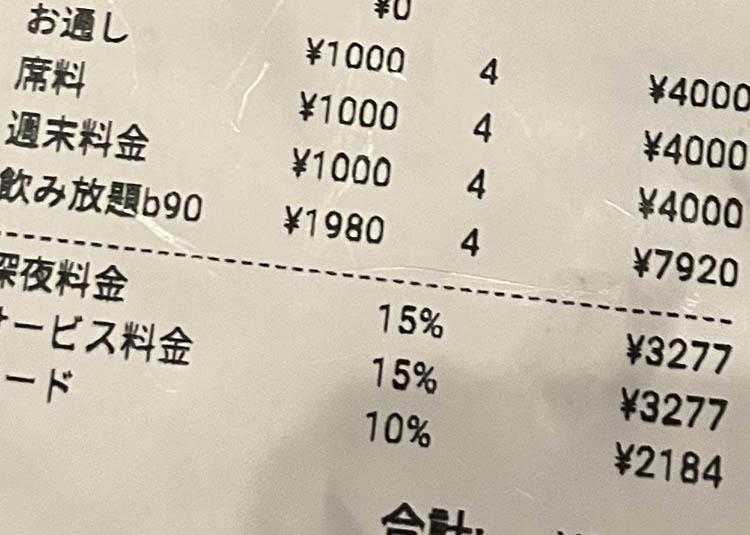
Airport Limousine Bus
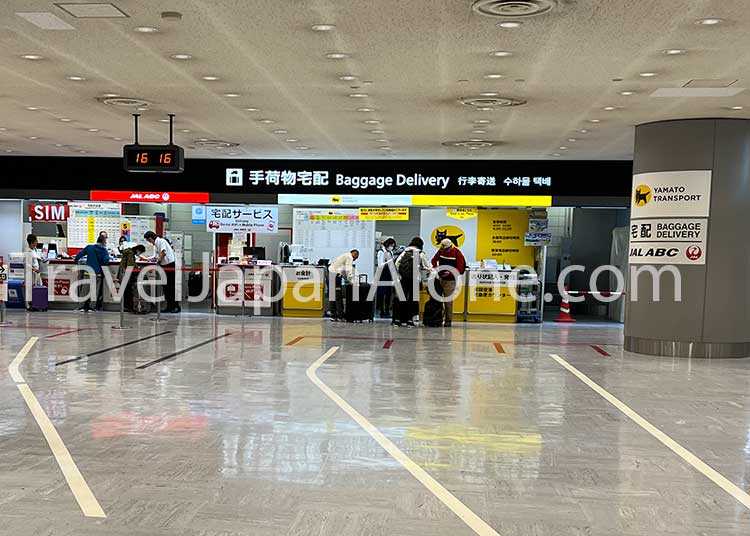
How to Manage Luggage During Travel?
Related posts.

Where Can I Get Pre-Paid Sim Cards in Japan?

teamLabs (No Spoilers)
Travel Japan Alone is a participant in the Amazon Services LLC Associates Program, an affiliate advertising program designed to provide a means for sites to earn advertising fees by advertising and linking to Amazon.com.

IMAGES
VIDEO
COMMENTS
1.-. Free entrance (paid exit): On of the most common scams in Japan. Once someone said "nothing comes free" and was totally right. Entrance prices to different attractions in Japan usually are one of the main complaint of tourists, specially on their first trips. That is why free stuff usually results specially attractive to visitors when ...
10 Common Tourist Scams in Japan and How to Avoid Them Japan is known to be one of the most resilient countries in the world and saw close to 4 million tourist visits in 2022. Known for its futuristic cities, tall skyscrapers that make for a scenic skyline, attractive food, fashion and serenity through nature, the country welcomes tourists year ...
Japan is one of the safest countries in the world. But even then it's not free from scams. We explore two of the worst.🎉 Get 3 Months FREE on Express VPN: h...
Most common travel scams in Japan. 1. Hoodwinked by fake monks at temples. The Fake Monk scam is one of the most infamous travel scams in Japan. The scam involves a person disguised as a monk and crouched near temples and shrines, waiting to hit on unknowing tourists.
In this video, we reveal Japan's biggest tourist scams that you need to be aware of in 2024. We expose the tactics used by scammers to take advantage of unsu...
Well, you are warned so don't fall for this scam. 11. Scouting for models. As a solo travel female traveller, this tourist scam in Japan targets you the most. In some hip and happening part of town, some people might approach you with a camera in hand, compliment you on your looks and ask if they click a photo or two.
This article will go in-depth on advice from frequent Japan visitors on what to skip while in Tokyo to help make the most of your visit. Be Wary of Scams Targeting Tourists. Sadly, Tokyo has its fair share of scammers trying to take advantage of visitors, especially in major tourist areas. Here are some common Tokyo travel scams to watch out for:
Here is how to avoid tourist scams in Tokyo , Japan in 2022. While this article will highlight the main tourist scams that tend to occur in Tokyo , I highly suggest you watch a documentary on Netflix about tourist scams called "Scam City" . Picture Scam One popular scam in Tokyo , Japan is when a local asks you to take their picture.
Introduction Understanding Scams in Japan Japan is known as one of the safest countries in the world with extremely low crime rates. However, as a popular tourist destination, Japan also sees its fair share of scams targeting foreign visitors. While violent crime is rare, tourists can often fall prey to petty theft, fraud, and financial scams. It's important to be aware of the common scams in ...
TOKYO — Bracing for an influx of tourists as the 2020 Olympics draw near, Tokyo police are warning of a potential increase in scams targeting foreigners in the city's entertainment districts.
Help Disaster Victims Scam. Japan Travel Scams and Dangers #2. Another fairly popular tourist scam is known as the "Disaster Relief " con. In this scam, you get approached by middle-aged women who appear pretty serious and harmless. They speak understandable English and are holding official-looking papers related to disaster relief donations.
What tourist scams are there in Japan? The Drop and Swap. Taxi drivers, waiters, shop keepers, and more will "accidentally" drop your change and pick up similar looking (though considerably less valuable) coins or notes instead. This is somewhat common in Japan but also throughout Asia.
Japan is one of the world's safest countries to travel but it's not without it's share of scammers. Today we'll help you identify the top 3 scams in japan so...
24 Hours in Osaka | 6 Things to do in Japan's Nightlife Capital. Osaka is Japan's nightlife capital; a vibrant city home to amazing food and people. On Day 17 of Journey Across Japan we spend a night out taking in the city! Leave us a LIKE if you enjoyed joining our night out!...
This scam is prevalent in Tokyo and it mainly targets the tourists. A fun night out drinking at a hostesses bar might accidentally cost you up to ¥2.6 million as well as a death threat from the bar staff if you don't pay the money. This scam commonly occurs in the Kabukicho area of Tokyo.
Don't do this in Japan! Chris and Pete go into more detail on the subject of one of Chris' most popular YouTube videos, 12 things not to do in Japan - also the guys read out some of your emails from the fax machine. What they're doing coming out of a fax machine, w...
Scams are very common in Japan, like in any other country that is a top tourist destination. Still, even scammers do not operate here as much as they do in the West. There have been reports of fraudulent credit card charges, especially in the areas of Roppongi and Kabuki-Cho in Tokyo, so it is highly recommended not to allow waiters or vendors ...
While Tokyo is often regarded as one of the safest big cities in the world, it still has scams that target tourists. Most of these scams revolve around bars...
The phishing scams come as similar cases are reported worldwide, and Japan sees a return to booming tourism levels after COVID-19 border restrictions were lifted.
Japan is an incredibly safe country in which to travel—theft levels are low and crime is rare. But, that doesn't mean you won't fall victim to a tourist scam in Japan. Become familiar with the most common scams to avoid here.
These are common scam scenarios: Arrested or detained by police or at the airport and being forced to pay a fee. Hospitalized but not being treated until fees are paid. Disappeared while transiting Japan. Kidnapped or mugged with extreme violence. Stranded in a war zone in a foreign country. You may have tried to help this person before, but ...
The common scams tourist fall for in some izakayas in Japan and how to avoid them. Learn what it is!
The only one that I can think of is the fake monk scam. Happened to us near the Meiji Jingu shrine, where some ridiculous "monk" comes up to you and gives you a cheap plastic coin thingie and asks for a "donation" for them to pray. They use this little book where "others" have donated 10,000 yen or more in order to get you to make a similar ...